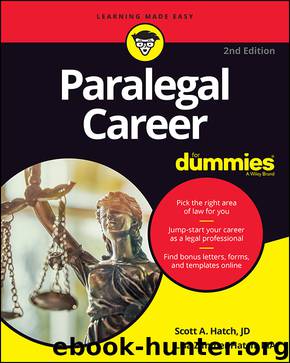Paralegal Career For Dummies by Scott A. Hatch & Lisa Zimmer Hatch

Author:Scott A. Hatch & Lisa Zimmer Hatch
Language: eng
Format: epub
ISBN: 9781119564935
Publisher: Wiley
Published: 2019-04-30T00:00:00+00:00
The opposing parties would probably disagree on the correct answers to these four questions, but knowing their actual answers is vital to the case. Your job is to uncover and verify through investigation the facts necessary to provide answers for each of these questions or issue statements.
What order will you follow? Creating checklists
Based on the relevant issues of a case, you create and rely on checklists to begin the fact gathering process. A checklist merely lists questions to answer and duties to accomplish in a sequential order. Your mission is to answer the questions and take on those duties in order to fully complete an investigative project.
You don’t have to make up a checklist from scratch. Other paralegals and attorneys have thought of these situations in other lawsuits, so you likely won’t need to reinvent the wheel. A great source for sample checklists is the American Jurisprudence Proof of Facts (POF) series, which details the necessary facts you need for virtually any investigative project. You can find this series of formbooks in law school libraries and most county courthouse law libraries. POF is also available through access to Westlaw online legal research service. You should begin your research in the topical index at the end of the POF series. When you refer to this series, you’ll find out how to prepare checklists for just about any type of lawsuit imaginable.
Over time, law offices compile their own sets of checklists for investigating common issues. For instance, your investigative project may require you to determine whether process was properly served upon the party named in the summons and complaint. You could use a checklist from your office’s information base to form the basis of your fact gathering process.
If you create checklists for new issues, you add them to the existing lists in your office’s workbooks for future use. As you become a successful fact gatherer, you’ll create new chapters of checklists that correspond to each area of inquiry.
Generally, investigation checklists should cover the following:
Known facts and whether they can be proved or supported
Facts that must be corroborated by supporting evidence
The kind of evidence that must be gathered
The way evidence should be gathered
Where you may find evidence (like agency documents, personal records, personnel files, business records, medical records, and so on)
The best method of inquiry (such as by telephone interview, letter, personal interview, formal discovery, and so on)
The appropriate timeframe required to complete the investigation
Download
This site does not store any files on its server. We only index and link to content provided by other sites. Please contact the content providers to delete copyright contents if any and email us, we'll remove relevant links or contents immediately.
| Law Office Education | Law Office Marketing & Advertising |
| Law Office Technology | Legal Services |
| Paralegals & Paralegalism | Reference |
| Research |
Every Landlord's Legal Guide by Janet Portman & Stewart Marcia & Ralph Warner(1675)
Philosophy of law a very short introduction by Raymond Wacks(1670)
How Innovation Works by Matt Ridley(1648)
Writing to Win: The Legal Writer by Steven D. Stark(1590)
Drafting Contracts: How and Why Lawyers Do What They Do, Second Edition by Stark Tina L(1499)
Law Man by Shon Hopwood(1443)
Nolo's Essential Guide to Divorce by Emily Doskow(1423)
So You Want to be a Lawyer by Lisa Fairchild Jones Esq(1417)
Profit From Your Idea: How to Make Smart Licensing Deals by Attorney Richard Stim(1348)
Nolo's Encyclopedia of Everyday Law: Answers to Your Most Frequently Asked Legal Questions by Shae Irving & Nolo (Editor)(1334)
Introduction to the study and practice of law in a nutshell by Kenney F. Hegland(1334)
Garner's Modern English Usage by Bryan Garner(1248)
Nolo's Encyclopedia of Everyday Law: Answers to Your Most Frequently Asked Legal Questions by Shae Irving; Nolo (Editor)(1243)
Best Practice by J.A. Armstrong(1200)
Insight Guides Japan (Travel Guide eBook) by Insight Guides(1189)
International Trade and Business: Law, Policy and Ethics by Gabriël Moens & Peter Gillies(1152)
Data Protection: A Practical Guide to UK and EU Law by Carey Peter(1143)
Credit Repair by Loftsgordon Amy(1044)
Everybody's Guide to Small Claims Court by Attorney Ralph Warner (Nolo)(1043)
